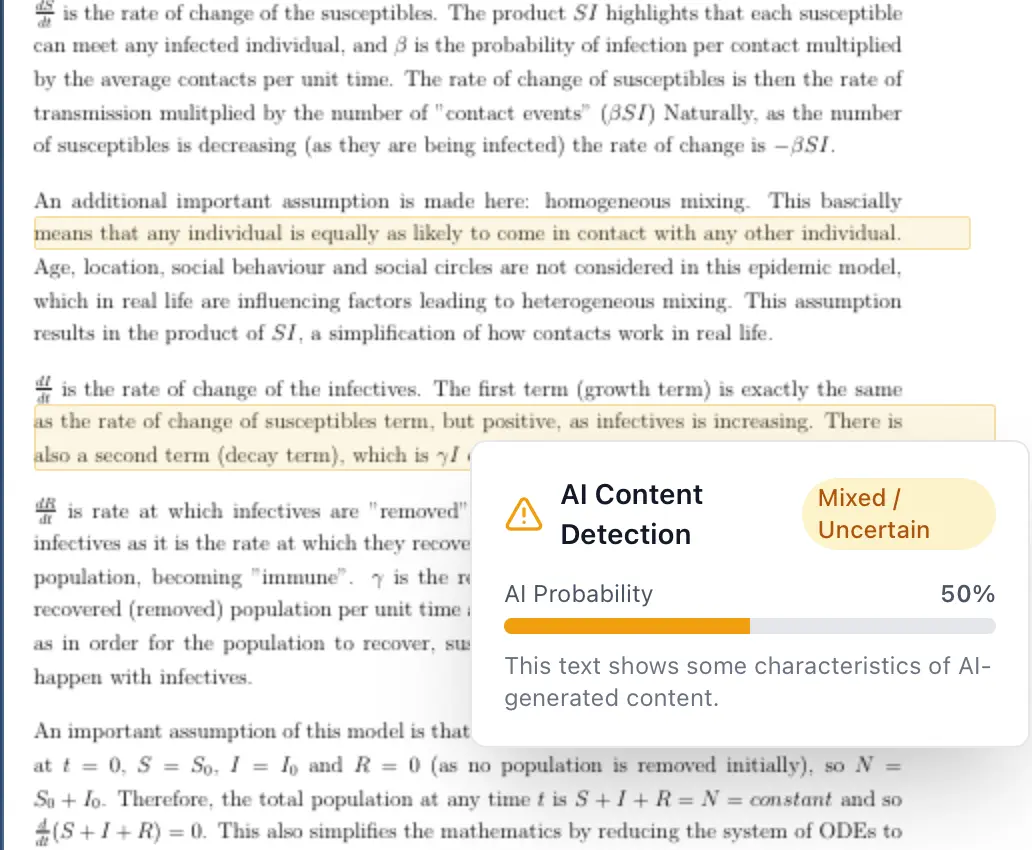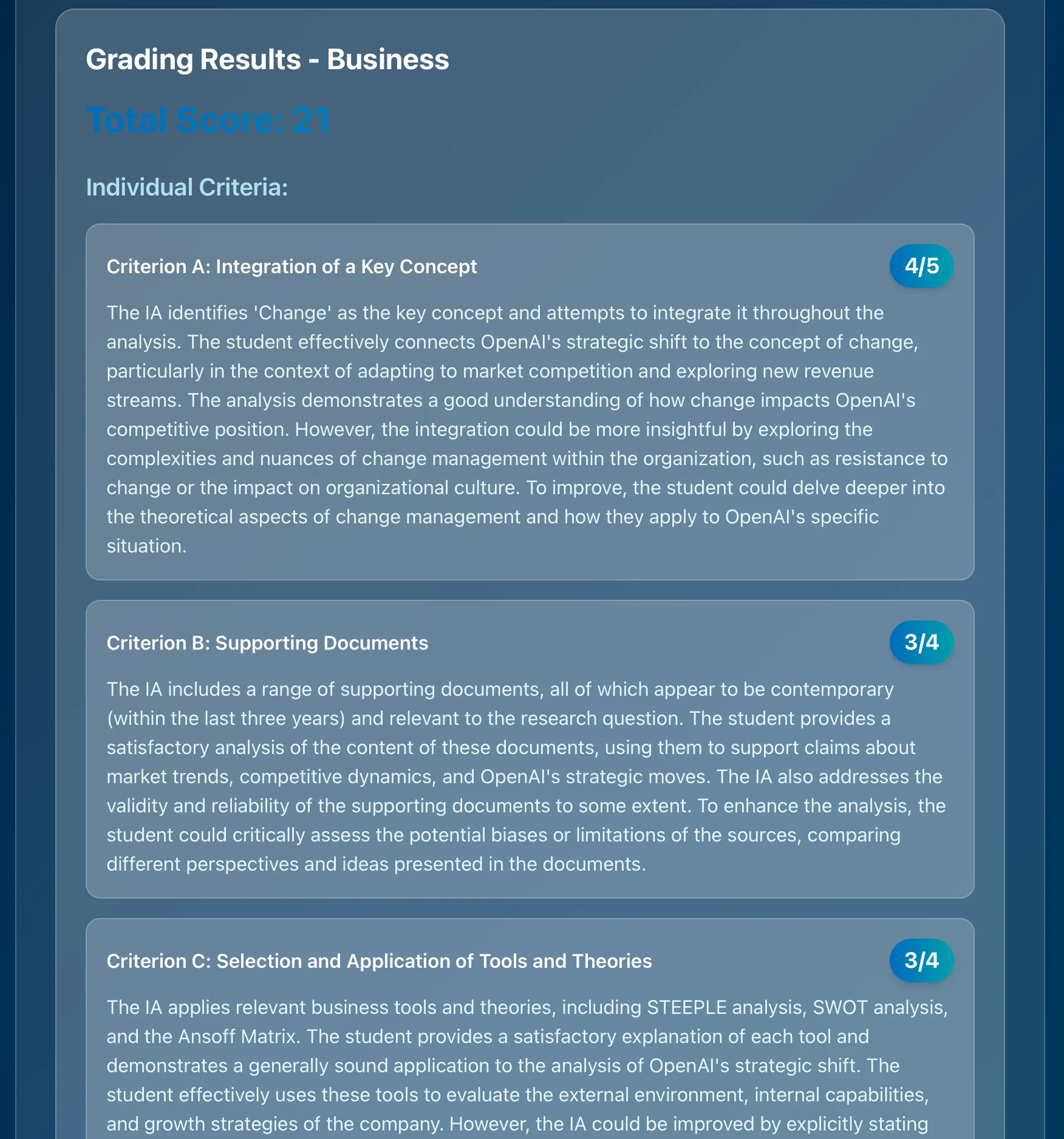Finding the Right Research Question for Your IB Business IA
Crafting a compelling research question is the cornerstone of a successful IB Business Internal Assessment (IA). It's the compass that guides your research, analysis, and ultimately, your final grade. Are you struggling to pinpoint a question that's both engaging and academically rigorous? This comprehensive guide will walk you through the process, providing expert tips, real-world examples, and actionable strategies to help you formulate a research question that sets you up for success. We'll also explore how AI-powered tools like Marksy can provide valuable feedback throughout your IA journey. By the end of this post, you'll have the knowledge and confidence to choose a research question that not only meets the IB criteria but also sparks your intellectual curiosity.
Why Your Research Question Matters (and How to Get It Right)
The research question is the single most important element of your IB Business IA. It determines the scope of your investigation, the types of data you'll collect, and the depth of your analysis. A well-defined research question is:
- Focused: It addresses a specific issue or problem within the business world.
- Researchable: It can be answered using available data and resources.
- Relevant: It connects to key business concepts and theories.
- Engaging: It sparks your interest and motivates you to conduct thorough research.
- Aligned with IB Criteria: It allows you to demonstrate your understanding of key concepts like change, ethics, and sustainability, as outlined in Criterion A.
Struggling with IB Assessments?
Get instant, detailed feedback on your work with AI that understands IB criteria.

Step-by-Step Guide to Formulating Your Research Question
Here's a structured approach to help you develop a strong research question:
Step 1: Identify Areas of Interest
Start by brainstorming topics within the business world that genuinely interest you. Consider current events, local businesses, or industries you find fascinating. Think about the key concepts in the IB Business Management course: strategy, innovation, marketing, finance, human resources, operations, and ethics.
Example:
- Interest: The impact of social media marketing.
- Interest: The ethical implications of fast fashion.
- Interest: The challenges faced by small businesses in your local area.
Step 2: Narrow Down Your Focus
Once you have a general area of interest, narrow it down to a specific issue or problem. Avoid overly broad topics that are difficult to research within the IA's word limit.
Example (Continuing from above):
- Broad: The impact of social media marketing.
- Narrowed: The effectiveness of Instagram advertising for local restaurants in [Your City/Region].
- Broad: The ethical implications of fast fashion.
- Narrowed: The impact of Zara's supply chain practices on worker exploitation in Bangladesh.
- Broad: The challenges faced by small businesses in your local area.
- Narrowed: The impact of COVID-19 lockdowns on the revenue of independent coffee shops in [Your City/Region].
Step 3: Consider Key Concepts
Integrate one of the four key concepts (change, creativity, ethics, or sustainability) into your research question. This is crucial for achieving high marks in Criterion A.
Example (Adding Key Concepts):
- Research Question: To what extent has the adoption of sustainable packaging (sustainability) impacted the brand image and customer loyalty of [Company Name]?
- Research Question: How has the implementation of remote work policies (change) affected employee productivity and job satisfaction at [Company Name]?
- Research Question: To what extent does the marketing strategy of [Company Name] reflect ethical considerations (ethics) regarding data privacy and consumer manipulation?
- Research Question: How can [Company Name] use creative (creativity) marketing strategies to increase its market share in the competitive [Industry] market?
Step 4: Ensure Researchability
Make sure your research question can be answered using available data and resources. Consider the following:
- Data Availability: Can you access relevant data through company websites, industry reports, surveys, or interviews?
- Time Constraints: Can you collect and analyze the data within the IA's timeframe?
- Accessibility: Can you realistically conduct interviews or surveys with the target audience?
Step 5: Refine and Finalize
Review your research question and refine it to ensure clarity, focus, and researchability. Consider the following questions:
- Is the question clear and easy to understand?
- Is the question specific enough to guide your research?
- Is the question relevant to the IB Business Management syllabus?
- Does the question allow you to demonstrate your understanding of key concepts and theories?
Examples of Strong IB Business IA Research Questions
Here are some examples of strong research questions that meet the criteria outlined above:
- To what extent has the implementation of a new CRM system (change) improved customer retention rates at [Company Name]?
- How can [Company Name], a local bakery, leverage social media marketing (creativity) to increase brand awareness and attract new customers?
- To what extent does [Company Name]'s commitment to fair trade practices (ethics) impact its competitive advantage in the [Industry] market?
- How can [Company Name], a clothing manufacturer, implement more sustainable (sustainability) production processes to reduce its environmental impact and enhance its brand image?
- To what extent did the change in interest rates (change) affect the profitability of [Company Name] in the last year?
Common Challenges and Mistakes
Many students struggle with formulating a strong research question. Here are some common mistakes to avoid:
- Overly Broad Questions: These are difficult to research and analyze within the IA's word limit.
- Example: "What are the challenges faced by businesses today?" (Too broad)
- Descriptive Questions: These simply describe a situation without analyzing its causes or consequences.
- Example: "What is the marketing strategy of Coca-Cola?" (Descriptive)
- Questions with Obvious Answers: These don't require in-depth research or analysis.
- Example: "Is it important for businesses to make a profit?" (Obvious)
- Failing to Integrate Key Concepts: This will significantly lower your score in Criterion A.
Advanced Tips and Strategies
- Consult with Your Teacher: Seek feedback from your teacher throughout the research question development process.
- Review Past IAs: Examine successful IAs from previous years to get inspiration and guidance. (Remember to avoid plagiarism!)
- Conduct Preliminary Research: Do some initial research to identify potential data sources and refine your research question.
- Focus on Local Businesses: Researching local businesses can provide access to valuable data and interview opportunities.
- Consider Current Events: Connect your research question to current events or trends in the business world.
Pro Tip: Get AI-Powered Grading
Stop second-guessing your grades. Get instant feedback aligned with official IB rubrics.

The Importance of Supporting Documents (Criterion B)
Remember that your IA requires between 3 and 5 supporting documents that are contemporary (within the last three years) and relevant to your research question. These documents should be analyzed in detail, and their validity and reliability should be critically assessed. Examples of supporting documents include:
- Company annual reports
- Industry reports
- Market research data
- News articles
- Academic journals
- Interviews (transcripts)
- Surveys (results)
Applying Business Tools and Theories (Criterion C)
Your IA should demonstrate your understanding and application of relevant business management tools and theories. Examples include:
- SWOT analysis
- PESTLE analysis
- Porter's Five Forces
- Ansoff Matrix
- Marketing Mix (4Ps or 7Ps)
- Financial ratios (e.g., profitability, liquidity)
- Maslow's Hierarchy of Needs
- Herzberg's Two-Factor Theory
Clearly explain the chosen tools and theories and demonstrate how they are applied to analyze your data and answer your research question. Be sure to state the strengths and weaknesses of your findings.
Technology and Modern Assessment: How AI Can Help
In today's digital age, technology is transforming the way we learn and assess. AI-powered tools are becoming increasingly valuable for IB students and teachers.
Marksy, for example, is a leading AI grading assistant specifically designed for the International Baccalaureate. It provides instant, accurate, and detailed feedback on student work based on official IB rubrics. This can be particularly helpful for the Business IA, where understanding the nuances of each criterion is crucial.
Here's how Marksy can help:
- Rubric-Aligned Scoring: Marksy uses the official IB Business Management IA rubric to assess your work, ensuring that you meet the specific requirements for each criterion.
- Detailed Criterion-by-Criterion Feedback: Marksy provides detailed feedback on each criterion, highlighting your strengths and areas for improvement.
- Suggestions for Improvement: Marksy offers specific suggestions on how to improve your IA and achieve a higher grade.
- Consistency in Grading: For teachers, Marksy ensures consistent and fair grading across all student submissions, saving valuable time and effort.
By leveraging AI tools like Marksy, students can gain a deeper understanding of the IB assessment criteria and receive personalized feedback to improve their work. Teachers can benefit from streamlined grading workflows and consistent assessment practices.
Conclusion: Take the Next Step Towards IA Success
Choosing the right research question is the first step towards a successful IB Business IA. By following the steps outlined in this guide, you can formulate a focused, researchable, and engaging question that sets you up for success. Remember to integrate key concepts, select relevant supporting documents, apply appropriate business tools and theories, and seek feedback from your teacher.
Ready to take your IB Business IA to the next level? Try Marksy for free today and experience the power of AI-powered feedback! See how Marksy can help you understand the IB rubric, improve your IA, and achieve your desired grade. For teachers, discover how Marksy can streamline your grading workflow and provide consistent, detailed feedback to your students.